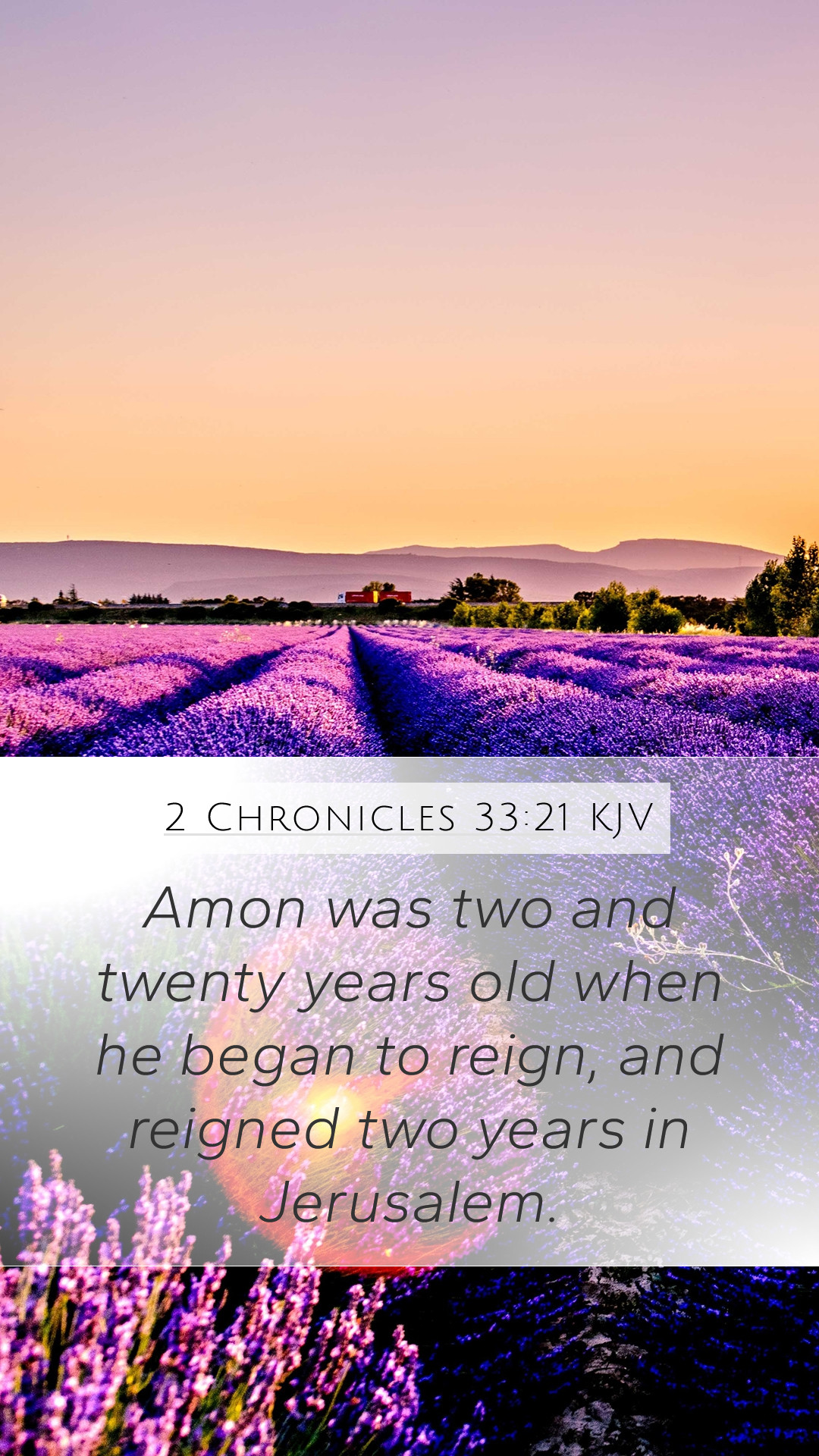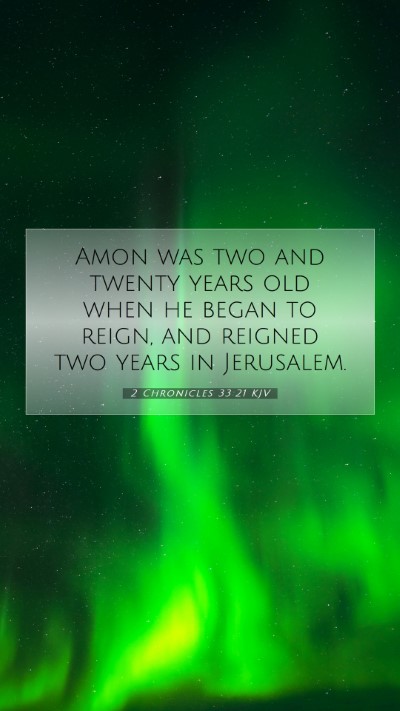Understanding 2 Chronicles 33:21
Bible Verse: 2 Chronicles 33:21 - "Amon was twenty-two years old when he began to reign, and he reigned two years in Jerusalem."
This verse introduces us to Amon, the king of Judah, and provides vital details about his age and the duration of his reign. This brief mention serves as a crucial springboard for deeper analysis of his life, governance, and the lessons gleaned from his story.
Bible Verse Meanings
The reign of Amon is succinctly accounted for in this verse, but its brevity signifies a deeper lesson on the consequences of ungodly leadership. The commentaries suggest several interpretations and insights:
- Historical Context: Amon follows his father, Manasseh, whose 55-year reign was marked by repentance after a period of severe idolatry. In contrast, Amon is viewed as a king who embraced and perpetuated the evil practices of his father before Manasseh's transformation.
- Age and Reign Duration: Amon was only 22 years old, which emphasizes the vulnerability and inexperience of youthful leadership. This can relate to discussions on the significance of wisdom in governance, aligning with various Bible study lessons that address leadership principles.
- Prophetic Significance: The account's brevity reminds readers that some lives, though short in duration, may bear great lessons, reinforcing the importance of examining one’s actions and their impact on future outcomes.
Bible Verse Commentary
From the public domain commentaries:
- Matthew Henry: Highlights Amon's evil ways, contrasting them with the previous reign of his father and the religious reforms carried out earlier. Amon represents a regression into idolatry and sin.
- Albert Barnes: Points to the fact that Amon’s reign was short-lived due to his notorious actions, which ultimately led to his assassination. This commentary emphasizes the moral of the story, shedding light on divine justice.
- Adam Clarke: Explains that despite being the son of a king who repented, Amon failed to learn from his father’s later life, suggesting a pattern of fallen generations. Clarke challenges readers to learn from history and the consequences of unrepentant sin.
Understanding Scripture
The verse can be studied in the context of the larger narrative in scripture, providing a springboard for different themes:
- Leadership and Influence: Amon’s leadership raises questions about the influence of previous generations and the importance of faith-based governance versus secular approaches.
- Divine Retribution: The story is a powerful reminder that ungodly practices lead to inevitable divine judgment, something echoed throughout both the Old and New Testaments.
- Life Lessons: Despite Amon's brief reign, the reflections on his leadership encourage readers to consider their own lives and decisions in light of scripture, a common theme in Bible study groups.
Cross References
For further study, consider these related verses that provide more context to Amon's life and the themes of leadership and repentance:
- 2 Kings 21:19 - Details on Amon's age and reign.
- 2 Chronicles 33:1-3 - Background on Manasseh's idolatry.
- 2 Kings 21:20-21 - The evil conduct of Amon compared to his father.
- 2 Chronicles 32:12 - A reflection on the consequences of sin.
Application of 2 Chronicles 33:21
The implications of Amon’s reign are profound as they challenge readers to consider:
- Personal Reflection: Just as Amon’s life illustrates leadership against wisdom, believers are called to reflect on their own choices and the legacy they will leave.
- Learning Opportunities: How can one learn from the failures of others? This verse compels readers to interpret scripture thoughtfully, considering historical contexts and personal actions.
- Faith and Responsibility: Amon’s story calls for an earnest discussion on the responsibilities of faith in public life and the critical evaluation of those who lead.
Conclusion
In summary, 2 Chronicles 33:21 serves as more than a mere chronological marker; it encapsulates vital truths about leadership, legacy, and the consequences of choices against divine instruction. Various commentaries resonate with themes of repentance, the nature of sin, and the importance of legacy, enriching the study of scripture and encouraging believers to engage deeply with God's word.
This analysis points to the importance of understanding the previous generations' impact on current leadership and invites believers to apply the lessons from Amon's short reign as practical insights in their own lives and communities.


